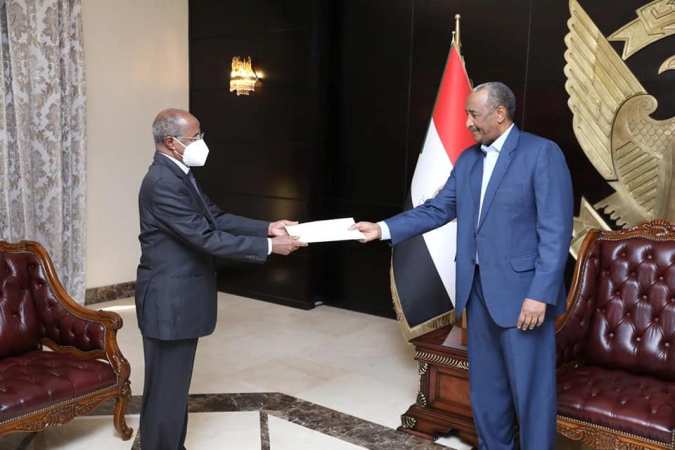Eritrean initiative on Sudan has nothing to do with Gulf countries: official
May 2, 2022 (KHARTOUM) – Eritrea dismissed reports that its initiative to end political strife in neighbouring Sudan was backed by Gulf countries.
A newsletter on African affairs reported last week that Saudi Arabia and the UAE are seriously concerned about the return of Sudan’s Islamists to power after the coup of General Abdel Fattah al-Burhan last October.
The two countries, in an attempt to ward off the Islamist threat, decided to back the efforts of Eritrean President Isaias Afewerki concluded the report.
In response to the report, Yemane Meskel Eritrea’s Minister of Information posted a tweet rejecting that their initiative was prodded by Gulf countries.
“First off, it is not in Eritrea’s DNA to undertake diplomatic tasks under bidding of others. Secondly, periodic consultation with Sudan on issues of mutual concern is a norm,” he stressed.
On April 16, Eritrean Foreign Minister Osman Saleh handed over to al-Burhan an initiative aiming to “bridge the views of the Sudanese parties to resolve the political crisis in the country,” according to a statement issued in Khartoum after the meeting.
General al-Burhan and his deputy are struggling to consolidate their grip on power and to rally political forces that can join them, including the Sudanese Islamist elements and former allies.
President Afewerki always focused on political stability in eastern Sudan. In 2006, he brokered a peace agreement between the East Front, a coalition of Beja armed groups, and the government in Khartoum.
The deal intervened after the signing of the internationally-backed Comprehensive Peace Agreement between the South Sudan rebels (SPLM) and the Islamist regime in Khartoum.
Now, the Eritrean initiative comes as the United Nations, African Union and IGAD are working to hold a dialogue between the Sudanese stakeholders to reach an agreement on how to achieve the political transition and hold general elections.
But Asmara is still not reassured by this process as the Eritrean leaders have another concern.
They believe that the current instability in Sudan and eastern Sudan particularly would open the door for the Eritrean opposition groups to set food there as they were forced to quit Ethiopia after the reconciliation between Asmara and Addis Abab.
(ST)

